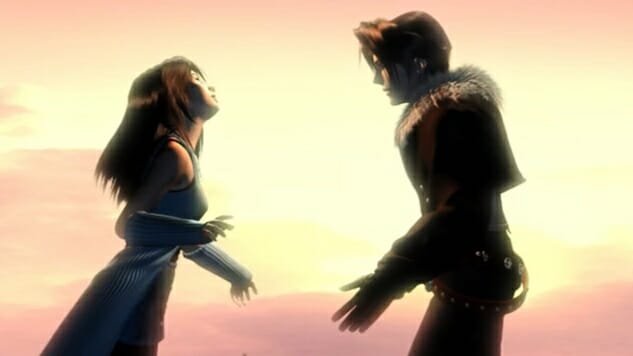In Praise of Final Fantasy VIII‘s Squall and Rinoa, the Most Misunderstood Characters in the Whole Series
Games Features Final Fantasy VIII
I only know one thing about my future wedding: “Eyes On Me,” the main theme of Final Fantasy VIII, will be the first-dance song.
Despite FFVIII’s divisiveness and lack of re-releases and remasters up until last week, I still adore it that much. I’m more excited for the upcoming remaster than I am for any new release this year—especially because I’ll play it with a fresh perspective. I’ve drastically changed since I first played it eight years ago.
The landscape of games writing has drastically changed, too. Today, we have a rapidly expanding spectrum of voices sparking more discussions about the culture and politics of games than ever before. As Final Fantasy VIII attracts new fans eager to experience one of the most well-known JRPGs ever, I hope we can re-examine Squall Leonhart and Rinoa Heartilly, who feel like two of the most misunderstood characters in the series.
Squall, like his name, is a constant storm of complex thoughts that contrast his aloof and silent exterior. Perhaps what people most know Squall for is his constant utterance of “whatever” to others. However, in the original Japanese text, his catchphrase is more of an off-handed, “…sorry,” conveying a depth that is slightly undercut in the English translation. Squall can’t remember his parents who died in the war, and his sister had to leave him behind in an orphanage without an explanation. After developing an antisocial personality that made people refrain from adopting him, he was admitted into a military academy and crafted into a tool of violence. When he’s confronted about his emotional stuntedness, it’s not quite that he doesn’t care; he simply doesn’t know how to respond.
Many men aren’t taught how to respond, or how to process their emotions. Squall suffers from the same treatment Final Fantasy VII’s protagonist does: his emotional problems are gravely misunderstood, especially because he’s a teen, so he’s dismissed as emo and whiny. These dismissals stem from toxic masculinity, from the belief that men should toughen up and get over their problems. Compared to other protagonists in the series, Squall feels more grounded in reality; the experiences that shaped him are things that can happen to any real person. In his eyes, he was twice abandoned, and this fear of abandonment is the root of his reluctance to allow anyone close.
This changes when he meets Rinoa. As I grew up, she felt like the most disliked Final Fantasy heroine; from irritating players with her optimism to being seen as a damsel in distress, she could never win. It upset me as someone who saw—and has continued to see—myself in her. I think it’s easy for a lot of us to. She’s an unextraordinary person who, as a result of witnessing widespread injustice, tries to do good. She opposes her father—a military general who serves a dictatorship—and joins a resistance group. She knows little about combat and the world in general, but that doesn’t keep her from fighting for people’s freedom.
She’s scared of failure, stubborn and naive—traits that constantly cause her to get in trouble and make mistakes (like any other person, especially at her age). She’s also compassionate, kind and idealistic. Her part in making the world a better place is small, but it’s vital. Not everyone who wants to improve the world can be Alexandria Ocasio-Cortez. Some are Amy Vilela, Cori Bush and Paula Jean Swearengin—equally kind, admirable and unrelenting people whose efforts in the face of opposition are just as necessary for representation, liberation and justice, even if they don’t get the same level of media attention. Some are people who do their best to be good and get by in a world that has made their existence a form of resistance. All of us who try in big and small ways, who screw up but continue working on ourselves and toward a better future, who don’t have all the answers but want to solve problems regardless, are significant.
Today, feminism has expanded to look like many different things and account for many different people. Thus, I hope we can see the strength of a girl who didn’t need to adhere to the notion that only one kind of labor matters for her labor to be important. As I’ve gotten older, I’ve realized Rinoa’s bravery and dedication to her causes were always incredibly heroic traits; she’s who Final Fantasy VIII wants you to admire from the beginning. Squall is who VIII works to humanize before asking you to admire at the end. With Squall, VIII subverts the archetype of the ruthless, cool and detached male hero by showing that someone like this likely harbors traumas and emotional struggles that need to be processed. Squall doesn’t need admiration or idealization; he needs someone to see his pain, listen to his silences and teach him how to become the person he wants to be.
That’s why watching the love between Squall and Rinoa develop can be so moving and heartwarming. I hope that, in 2019, we appreciate them a little more as two quietly revolutionary characters who are drawn together through a mutual desire to be better—and who do become better, with each other’s help.
Natalie Flores is a freelance writer who loves to talk about games, K-pop and too many other things at @heartimecia.